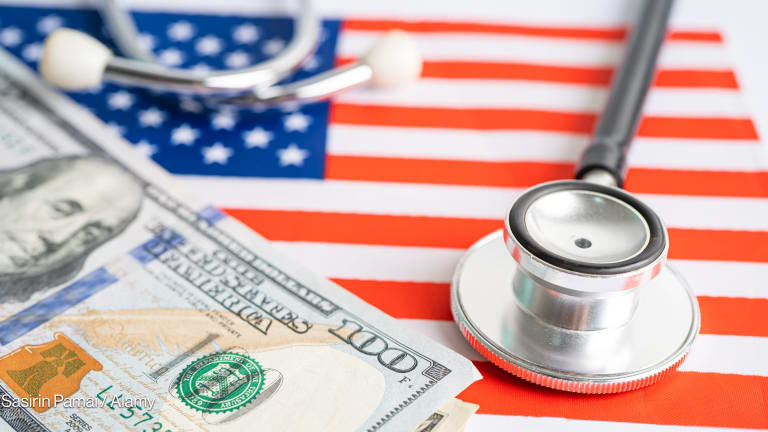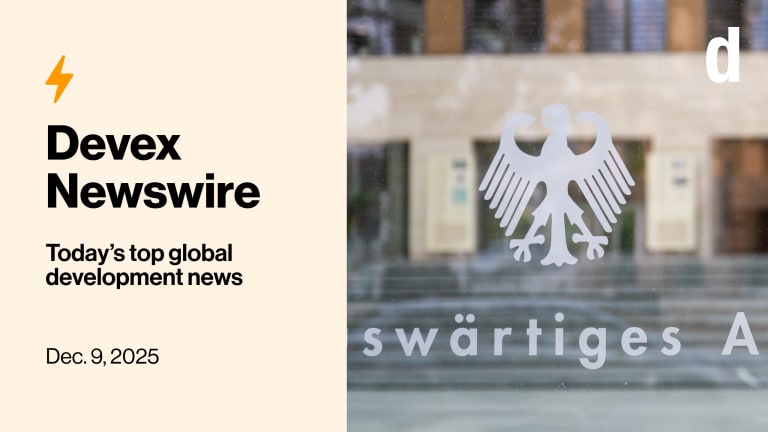
Criticism erupted in Kenya after Reuters reported the country had offered some of its COVAX Facility-supplied COVID-19 vaccines to between 25,000 and 30,000 diplomats, United Nations workers, and their families living in the country.
In its initial shipment, Kenya received 1 million doses through the COVAX Facility, intended to provide access to high-risk, priority groups. The country is targeting 1.25 million front-line workers — including health workers, security personnel, clergy members, as well as teachers, and others working in education — as the first group to vaccinate. It's just added people above the age of 58 as the country experiences skyrocketing cases.
Sign up for Devex CheckUp
The must-read newsletter for exclusive global health news and insider insights.
Chair of the Kenya Human Rights Commission Board of Directors Makau Mutua tweeted he was shocked the country had offered its “meager” doses from the facility to “privileged” diplomats and U.N. staff “ahead of its generally poor/vulnerable population."
Though Cabinet Secretary for Health Mutahi Kagwe defended the position, saying it was not an abuse of the use of the vaccines and the government said offering doses is part of the responsibility of a nation hosting a large number of diplomats, the news raised questions over whether expatriates should source vaccines from elsewhere rather than using up national supplies.
Countries are taking different approaches as to whether or not to supply their employees abroad with vaccines and whether to prioritize high-risk groups or blanketly vaccinate. Some countries are shipping vaccines to their embassies, while others are working with host countries to integrate their citizens into national vaccination plans. And some are leaving it up to citizens to get vaccinated the next time they visit their home country.
“We are in this all together. And the more we are going to protect first the at-risk groups — being nationals or foreigners — the better. I think that should be our priority.”
— Dr. Richard Mihigo, immunization and vaccine development program coordinator, WHO Regional Office for Africa‘Grotesque’ gaps in access
Globally, there have been criticisms around the management of supplies of vaccines, including the hoarding of excessive supplies and working to vaccinate entire populations before priority groups are vaccinated globally.
In a recent press briefing, World Health Organization Director-General Tedros Adhanom Ghebreyesus called the gap between the number of doses of vaccines administered in rich countries in comparison to those distributed through the COVAX Facility as increasingly "grotesque.”
“Countries that are now vaccinating younger, healthy people at low risk of disease are doing so at the cost of the lives of health workers, older people, and other at-risk groups in other countries,” he said.
Some of these trends are also playing out in embassies abroad, where foreign nationals have been inoculated before high-risk individuals in host countries.
Representatives from WHO and Africa Centres for Disease Control and Prevention said it’s understandable that governments are working to protect employees abroad, particularly in countries where the coronavirus is circulating widely.
But they also stressed this should be done within frameworks that prioritize distribution of vaccines to high-risk groups, such as health care workers, the elderly, and those with underlying diseases first.
During a recent press conference, Africa CDC Director Dr. John Nkengasong said if countries “can support their own citizens, wherever they are, I do not see anything wrong with that.”
Dr. Richard Mihigo, immunization and vaccine development program coordinator at WHO’s Regional Office for Africa, said in many countries, foreigners and diplomats have been prioritized for inoculation if they fit the priority group that the host government has set up — “which is indeed a very, very good thing.”
“We are in this all together. And the more we are going to protect first the at-risk groups — being nationals or foreigners — the better. I think that should be our priority,” he said.
Shipping vaccines to embassies
Domestically, the United States first vaccinated its high-risk citizens, but many states are planning to open access to all adults starting next month.
The U.S. Department of State has sped up this process for its employees abroad, like those who work for the U.S. Agency for International Development, by shipping vaccines to embassies. The department has requested enough doses to vaccinate all of its personnel as supplies become available. It received its fourth allotment of vaccines, which include doses of Pfizer, Moderna, and Johnson & Johnson vaccines, and expects to receive more doses.
“This will allow the Department to advance U.S. national security interests and ensure America’s essential diplomacy continues unimpeded,” said a State Department official.
Interactive: What does the data show about COVID-19 vaccine diplomacy?
Over 20 million COVID-19 vaccine doses have been directly donated to 81 low- and middle-income countries. China and India are now in a neck-and-neck battle to be seen as the most generous donor.
The State Department will not be vaccinating all of its citizens abroad, though, and has told citizens to either secure vaccines in the country they live or travel home for a vaccine. They have also warned citizens against the use of vaccines from China and Russia as they have not provided “transparent, peer-reviewed scientific evidence of their safety and efficacy.”
A U.S. government employee in Nairobi, who wished to remain anonymous as she spoke unofficially, said she received her first dose of the Pfizer vaccination in early March and the second dose last week. The distribution of vaccines was not dictated by high-risk groups, she said, and “everyone was allowed (and encouraged) to get vaccinated,” adding that she’s been told a high number of U.S. employees in Kenya have already been inoculated.
“It’s an immense privilege,” she said.
Israel also started domestically vaccinating its high-risk populations but quickly moved to broaden this. Last week, Israel’s Health Minister Yuli Edelstein tweeted that more than half of Israelis have received their second dose.
In recent months, Israel’s embassy workers abroad were brought to Israel to get vaccinated on flights specifically chartered from several locations. The passengers were flown into Israel’s airport, vaccinated and served a meal, and flown back to their stations. The process is currently being repeated for the second dose.
This has covered vaccinations for most of Israel’s workers abroad, Michael Stainmatz, chief executive national vaccine operations manager at Israel's Ministry of Health, told Devex.
Israel decided to ship the Pfizer vaccine to the U.S. due to the large number of staff stationed there. Those shipments arrived last week. The U.S. is one of the last diplomatic posts Israel is vaccinating, according to Stainmatz.
With these operations, the Israeli government is targeting all of its embassy staff and their families.
“It’s a very important and high-level operation to do. I think it's also fair,” Stainmatz said.
The government has also offered to vaccinate up to 3000 foreign embassy staff located in Israel.
Russia is also working to serve its embassies with its Sputnik V vaccine. A representative for the Russian Embassy in Ghana said it would vaccinate embassy employees as soon as logistical matters of getting the vaccines to Ghana are resolved but would not specify whether all their employees would receive the vaccine.
According to Russia’s Ministry of Foreign Affairs, the country has also offered all foreign embassy staff in Russia and their families the Sputnik V vaccine for free. The ministry tweeted that many diplomats have already accepted the offer.
The United Kingdom also started shipping vaccines to some countries at the beginning of March. Staff in locations such as Beirut, Baghdad, and Kathmandu have already received vaccines. Vaccines have been rolled out on a high-risk priority basis.
“Our program is completely aligned to the U.K. program on eligibility and timing, and currently, we are only targeting those who would be in the priority groups receiving vaccinations in the U.K.,” said a Foreign, Commonwealth & Development Office spokesperson.
Other countries are leaving it up to their citizens. For example, Swedish and Danish diplomats were instructed to get vaccinated when they travel home for work or personal leave, embassy representatives told Devex.
Relying on national plans
Many countries are also leaning on the host governments to integrate foreigners into national vaccination plans.
In Brief: Kenya hits new peak for COVID-19 cases
The number of cases in Nairobi is "staggering," and has risen precipitously in recent days.
Wherever possible British nationals should aim to be vaccinated where they live if a country has "well-developed medical infrastructures," an FCDO spokesperson said, adding that host nations have vaccinated U.K. diplomats in locations including Bahrain, United Arab Emirates, and Israel.
A spokesperson for the British Embassy in Kathmandu said it is not aware of any U.K. embassy staff that have been offered COVAX Facility-supplied vaccine, but Nepal's government did offer to vaccinate staff of foreign missions with vaccines donated from India.
The Chinese government announced in early March a program aimed at setting up vaccination stations in foreign countries for Chinese nationals to be vaccinated with Chinese vaccines.
But this plan has faced challenges including “local vaccination regulations, vaccine entry approval or even political concerns,” according to the Chinese media outlet Global Times.
The Chinese Embassy in Egypt launched a vaccination campaign targeting 5,000 citizens with the country’s Sinopharm COVID-19 vaccine, with two medical institutions assigned to do the vaccination, according to CGTN. China negotiated with Egypt for Chinese residents to be considered “priority groups” in Egypt, according to the Global Times.
Overall, China has provided 650,000 doses of its Sinopharm vaccine to Egypt, the majority of which were donated.
Kenya’s Ministry of Health did not respond to requests about whether doses supplied to diplomats would be distributed on a high-risk priority basis.









